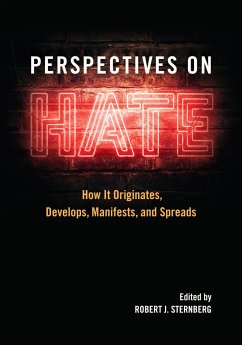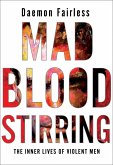Perspectives on Hate: How It Originates, Develops, Manifests, and Spreads
Herausgeber: Sternberg, Robert J.
Perspectives on Hate: How It Originates, Develops, Manifests, and Spreads
Herausgeber: Sternberg, Robert J.
- Broschiertes Buch
- Merkliste
- Auf die Merkliste
- Bewerten Bewerten
- Teilen
- Produkt teilen
- Produkterinnerung
- Produkterinnerung
Renowned psychologist Robert J. Sternberg assembles a diverse group of experts to examine how hate originates, develops, manifests, and spreads—and how it can be counteracted.
Andere Kunden interessierten sich auch für
![Strengths-Based Prevention Strengths-Based Prevention]() Victoria BanyardStrengths-Based Prevention66,99 €
Victoria BanyardStrengths-Based Prevention66,99 €![Contemporary Immigration: Psychological Perspectives to Address Challenges and Inform Solutions Contemporary Immigration: Psychological Perspectives to Address Challenges and Inform Solutions]() Contemporary Immigration: Psychological Perspectives to Address Challenges and Inform Solutions77,99 €
Contemporary Immigration: Psychological Perspectives to Address Challenges and Inform Solutions77,99 €![How Finkelstein Broke the Trauma Bond, and Beat the Holocaust: Traumatic Memory and the Struggle Against Systemic Evil How Finkelstein Broke the Trauma Bond, and Beat the Holocaust: Traumatic Memory and the Struggle Against Systemic Evil]() Lawrence SwaimHow Finkelstein Broke the Trauma Bond, and Beat the Holocaust: Traumatic Memory and the Struggle Against Systemic Evil36,99 €
Lawrence SwaimHow Finkelstein Broke the Trauma Bond, and Beat the Holocaust: Traumatic Memory and the Struggle Against Systemic Evil36,99 €![Mad Blood Stirring: The Inner Lives of Violent Men Mad Blood Stirring: The Inner Lives of Violent Men]() Daemon FairlessMad Blood Stirring: The Inner Lives of Violent Men18,99 €
Daemon FairlessMad Blood Stirring: The Inner Lives of Violent Men18,99 €![A Terrible Love of War A Terrible Love of War]() James HillmanA Terrible Love of War24,99 €
James HillmanA Terrible Love of War24,99 €![Character Disturbance: The Phenomenon of Our Age Volume 1 Character Disturbance: The Phenomenon of Our Age Volume 1]() George K. SimonCharacter Disturbance: The Phenomenon of Our Age Volume 118,99 €
George K. SimonCharacter Disturbance: The Phenomenon of Our Age Volume 118,99 €![Relentless Courage Relentless Courage]() Shauna SpringerRelentless Courage20,99 €
Shauna SpringerRelentless Courage20,99 €-
-
-
Renowned psychologist Robert J. Sternberg assembles a diverse group of experts to examine how hate originates, develops, manifests, and spreads—and how it can be counteracted.
Hinweis: Dieser Artikel kann nur an eine deutsche Lieferadresse ausgeliefert werden.
Hinweis: Dieser Artikel kann nur an eine deutsche Lieferadresse ausgeliefert werden.
Produktdetails
- Produktdetails
- Verlag: American Psychological Association (APA)
- Seitenzahl: 329
- Erscheinungstermin: 26. Mai 2020
- Englisch
- Abmessung: 254mm x 178mm x 15mm
- Gewicht: 544g
- ISBN-13: 9781433831539
- ISBN-10: 1433831538
- Artikelnr.: 58019273
- Herstellerkennzeichnung
- Libri GmbH
- Europaallee 1
- 36244 Bad Hersfeld
- gpsr@libri.de
- Verlag: American Psychological Association (APA)
- Seitenzahl: 329
- Erscheinungstermin: 26. Mai 2020
- Englisch
- Abmessung: 254mm x 178mm x 15mm
- Gewicht: 544g
- ISBN-13: 9781433831539
- ISBN-10: 1433831538
- Artikelnr.: 58019273
- Herstellerkennzeichnung
- Libri GmbH
- Europaallee 1
- 36244 Bad Hersfeld
- gpsr@libri.de
Robert J. Sternberg is Professor of Human Development at Cornell University and Honorary Professor of Psychology at Heidelberg University, Germany. His BA is from Yale summa cum laude, his PhD is from Stanford, and he has 13 honorary doctorates from around the world. He has won the Grawemeyer Award in Psychology and the James and Cattell Awards from APS. He is a past-president of APA and of the Federation of Associations in the Behavioral and Brain Sciences. He is a member of the American Academy of Arts and Sciences and the National Academy of Education. He lives in Ithaca, NY.
Preface
Chapter 1. FLOTSAM: A Theory of the Development and Transmission of Hate.
Robert J. Sternberg.
I. Defining Hate
Chapter 2. Hate, Dehumanization, and “Hate.” Nick Haslam and Sean C.
Murphy.
Chapter 3. The Essence of Hate and Love. Clark McCauley.
Chapter 4. What Is Hate? Thomas Brudholm.
II. Cognitive and Emotional Processes that Lead to Hateful Behavior
Chapter 5. Theorizing Hate in Contemporary USA. Susan Opotow and Sara I.
McClelland.
Chapter 6. Channeling Anger and Hate for Protecting Human Life. Israel W.
Charny.
Chapter 7. Hate in Contemporary America: Pathology or Opportunism?
Richard M. Lerner and Paul A. Chase.
Chapter 8. FLOTSAM: The Theory in Practice: Understanding the Reawakening
of Hate in the Modern World. Robert J. Sternberg.
III. Hate Crimes
Chapter 9. Hate Crimes in Transition. Jack Levin and Jack McDevitt.
Chapter 10. “Hate Speech,” Free Speech, and Group Violence. David
Moshman.
Chapter 11. Tolerating Hate: Racial Bias, Freedom of Speech, and Responses
to Hate Crimes. Gina Roussos and John F. Dovidio.
Chapter 12. “Message” Crimes: Understanding the Community Impacts of Bias
Crime. Rebecca L. Stotzer and Adriano Sabagala.
Chapter 13. Should Misogyny Be a Protected Characteristic in Hate Crime
Legislation? Amanda Haynes and Jennifer Schweppe.
IV. Conclusion
Chapter 14. FLOTSAM Themes in the Volume. Robert J. Sternberg.
Chapter 1. FLOTSAM: A Theory of the Development and Transmission of Hate.
Robert J. Sternberg.
I. Defining Hate
Chapter 2. Hate, Dehumanization, and “Hate.” Nick Haslam and Sean C.
Murphy.
Chapter 3. The Essence of Hate and Love. Clark McCauley.
Chapter 4. What Is Hate? Thomas Brudholm.
II. Cognitive and Emotional Processes that Lead to Hateful Behavior
Chapter 5. Theorizing Hate in Contemporary USA. Susan Opotow and Sara I.
McClelland.
Chapter 6. Channeling Anger and Hate for Protecting Human Life. Israel W.
Charny.
Chapter 7. Hate in Contemporary America: Pathology or Opportunism?
Richard M. Lerner and Paul A. Chase.
Chapter 8. FLOTSAM: The Theory in Practice: Understanding the Reawakening
of Hate in the Modern World. Robert J. Sternberg.
III. Hate Crimes
Chapter 9. Hate Crimes in Transition. Jack Levin and Jack McDevitt.
Chapter 10. “Hate Speech,” Free Speech, and Group Violence. David
Moshman.
Chapter 11. Tolerating Hate: Racial Bias, Freedom of Speech, and Responses
to Hate Crimes. Gina Roussos and John F. Dovidio.
Chapter 12. “Message” Crimes: Understanding the Community Impacts of Bias
Crime. Rebecca L. Stotzer and Adriano Sabagala.
Chapter 13. Should Misogyny Be a Protected Characteristic in Hate Crime
Legislation? Amanda Haynes and Jennifer Schweppe.
IV. Conclusion
Chapter 14. FLOTSAM Themes in the Volume. Robert J. Sternberg.
Preface
Chapter 1. FLOTSAM: A Theory of the Development and Transmission of Hate.
Robert J. Sternberg.
I. Defining Hate
Chapter 2. Hate, Dehumanization, and “Hate.” Nick Haslam and Sean C.
Murphy.
Chapter 3. The Essence of Hate and Love. Clark McCauley.
Chapter 4. What Is Hate? Thomas Brudholm.
II. Cognitive and Emotional Processes that Lead to Hateful Behavior
Chapter 5. Theorizing Hate in Contemporary USA. Susan Opotow and Sara I.
McClelland.
Chapter 6. Channeling Anger and Hate for Protecting Human Life. Israel W.
Charny.
Chapter 7. Hate in Contemporary America: Pathology or Opportunism?
Richard M. Lerner and Paul A. Chase.
Chapter 8. FLOTSAM: The Theory in Practice: Understanding the Reawakening
of Hate in the Modern World. Robert J. Sternberg.
III. Hate Crimes
Chapter 9. Hate Crimes in Transition. Jack Levin and Jack McDevitt.
Chapter 10. “Hate Speech,” Free Speech, and Group Violence. David
Moshman.
Chapter 11. Tolerating Hate: Racial Bias, Freedom of Speech, and Responses
to Hate Crimes. Gina Roussos and John F. Dovidio.
Chapter 12. “Message” Crimes: Understanding the Community Impacts of Bias
Crime. Rebecca L. Stotzer and Adriano Sabagala.
Chapter 13. Should Misogyny Be a Protected Characteristic in Hate Crime
Legislation? Amanda Haynes and Jennifer Schweppe.
IV. Conclusion
Chapter 14. FLOTSAM Themes in the Volume. Robert J. Sternberg.
Chapter 1. FLOTSAM: A Theory of the Development and Transmission of Hate.
Robert J. Sternberg.
I. Defining Hate
Chapter 2. Hate, Dehumanization, and “Hate.” Nick Haslam and Sean C.
Murphy.
Chapter 3. The Essence of Hate and Love. Clark McCauley.
Chapter 4. What Is Hate? Thomas Brudholm.
II. Cognitive and Emotional Processes that Lead to Hateful Behavior
Chapter 5. Theorizing Hate in Contemporary USA. Susan Opotow and Sara I.
McClelland.
Chapter 6. Channeling Anger and Hate for Protecting Human Life. Israel W.
Charny.
Chapter 7. Hate in Contemporary America: Pathology or Opportunism?
Richard M. Lerner and Paul A. Chase.
Chapter 8. FLOTSAM: The Theory in Practice: Understanding the Reawakening
of Hate in the Modern World. Robert J. Sternberg.
III. Hate Crimes
Chapter 9. Hate Crimes in Transition. Jack Levin and Jack McDevitt.
Chapter 10. “Hate Speech,” Free Speech, and Group Violence. David
Moshman.
Chapter 11. Tolerating Hate: Racial Bias, Freedom of Speech, and Responses
to Hate Crimes. Gina Roussos and John F. Dovidio.
Chapter 12. “Message” Crimes: Understanding the Community Impacts of Bias
Crime. Rebecca L. Stotzer and Adriano Sabagala.
Chapter 13. Should Misogyny Be a Protected Characteristic in Hate Crime
Legislation? Amanda Haynes and Jennifer Schweppe.
IV. Conclusion
Chapter 14. FLOTSAM Themes in the Volume. Robert J. Sternberg.








